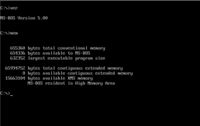Difference between revisions of "MS-DOS"
| Line 1: | Line 1: | ||
| + | [[Image:MS-DOS 5.0.jpg|thumb|200px|right|MS-DOS 5.0 under Virtual PC.]] | ||
MS-DOS was made popular by [[Microsoft]] for not only being the bundled OS on the [[IBM-PC]] but also being available to the other clone OEM's of the time. | MS-DOS was made popular by [[Microsoft]] for not only being the bundled OS on the [[IBM-PC]] but also being available to the other clone OEM's of the time. | ||
Revision as of 05:04, 23 August 2009
MS-DOS was made popular by Microsoft for not only being the bundled OS on the IBM-PC but also being available to the other clone OEM's of the time.
Microsoft had sold IBM on the idea of MS-DOS when talks for CP/M had broken down. At the time Microsoft had no such product but was able to secure the rights to "86-DOS" a CP/M clone written by Tim Paterson for the sum of $50,000. This has been the best ROI ever, as MS-DOS has made Microsoft untold billions of dollars.
MS-DOS uses the int21 interface to allow programs to communicate with MS-DOS. It is designed to be a single tasking OS, that runs on the 8088/8086 cpu, and on the real mode of the 80286 and higher CPU's. There are ways to crudely multitask via TSR's and other shells that hook the clock interrupt and jump execution although these are usually unstable at best.
DOS made use of the FAT filesystem, and thus its popularity.
Contents
Versions
MS-DOS 1.0
This was the first version to lauch with the IBM 5150 or better known as the IBM PC.
MS-DOS 2.0
I think this release added support for the IBM XT and hard disks. hierarchical filesystems were a new addition as well.
MS-DOS 3.0
I think this release added support for 5 1/4" high density disks, and the IBM AT.
MS-DOS 3.1
MS-DOS 3.2
MS-DOS 3.3
I think this release added support for the 3 1/2" high density floppy.
MS-DOS 4.0
This was the first release to support logical drives & extended partitions. This was also the first time that Microsoft had sold MS-DOS as a retail product, which was a break from the traditional OEM channels that Microsoft had fostered. I recall it selling for $50.
MS-DOS 5.0
This release was signifigant to allow for FAT partitions larger then 32MB, going up to 2GB. Also big features were himem.sys which allowed MS-DOS to execute in the top 64kb of protected mode because of a hardware bug in the IBM AT's handling of extended memory. Emm386.sys also was made popular allowing 386's to simulate EMS memory with extended memory, and loading device drivers & TSR's into the reserved hardware space. I'm pretty sure disk defragmentation utlity was also included in this version.
Version 5.0 also brough Qbasic, to replace the aging GWBasic.
MS-DOS 6.0
This release added disk compression in order to compete with DR-DOS.
MS-DOS 6.21
MS-DOS 6.22
This release was to rectify the various lawsuits around the bundled disk compression.
